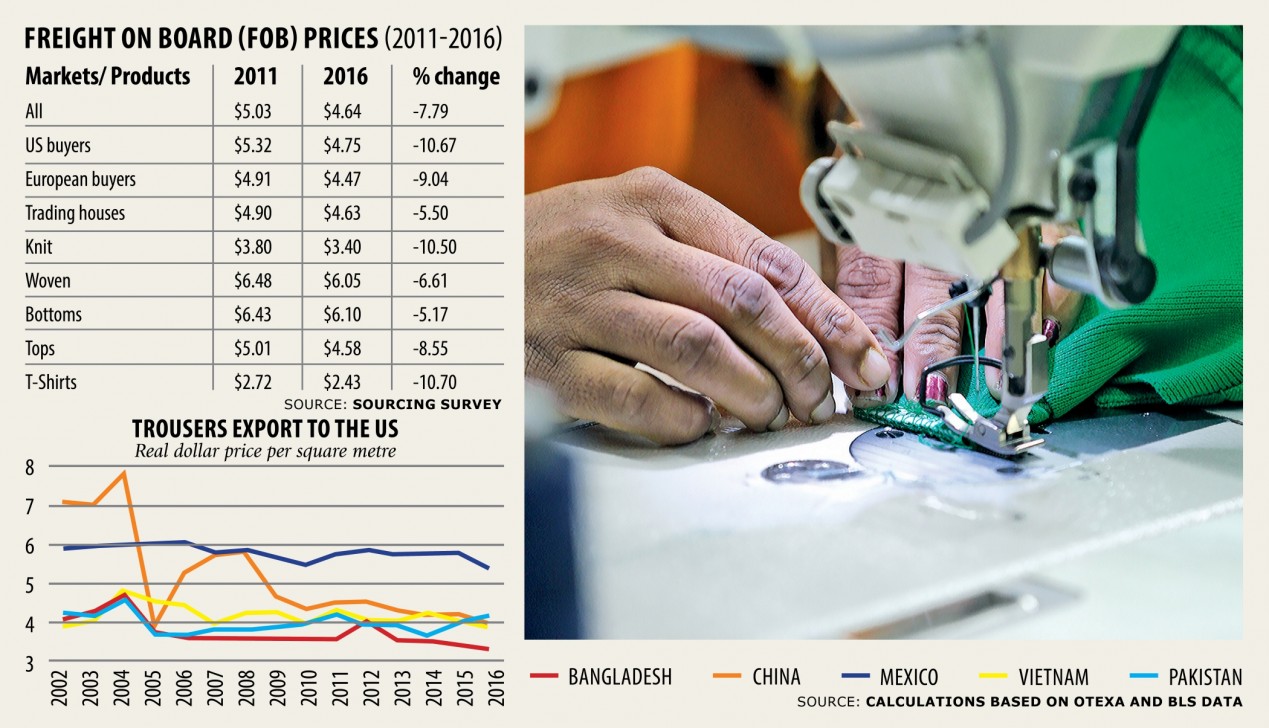39pc RMG exporters supply at losses, a study finds

As many as 39 percent of the Bangladeshi garment exporters accept prices below their production costs for the sake of business relations with international retailers, according to a study by the Fair Wear Foundation (FWF).
Based in Amsterdam, FWF is an independent multi-stakeholder organisation that works with garment brands, garment workers and industry influencers to improve labour conditions in garment factories.
Apart from the threat of severed business ties, the suppliers accepted work orders from froeign buyers at rates lower than their production costs for mistakes in cost calculation or to one-up their competitors, the study also found.
If the suppliers do not accept prices below their production costs, they will lose everything as they will have to pay the workers at the end of the month without any production in the factories, said Koen Oosterom, FWF’s country manager for Bangladesh and Myanmar.
The findings of the study styled “Labour minute costing and price negotiations with buyers” was shared at an event held at the capital’s Lakeshore Hotel. The data used were from 2013 to 2016.
The factory management also accepts lower prices in the hope of price hike and profit in future, he said.
The effects of selling the garment items at prices lower than the production costs are more dangerous.
Some 33 percent think they will face the risk of closure and 29 percent will face difficulties in wage payment to workers, the study also said.
Only 13 percent of the buyers who source from Bangladesh increased the prices of garment items after the minimum wage hike in 2013.
Globally, the picture is almost similar to Bangladesh.
During that time, only 25 percent of the global buyers had increased the prices of the garment items after the wage hike, he said.
Between 2011 and 2016, the overall prices of Bangladeshi garment items declined 7.79 percent.
The picture of price hike by buyers following the latest round of the minimum wage increase in December last year is worse than that of 2013: only one out of the 20 buyers increased the prices, Oosterom told The Daily Star.
Every time the international retailers put pressure on the manufacturers to comply with their rules, they should also be mindful of the rates they offer the factory owners, said Mohammad Abdul Momen, director of the Bangladesh Garment Manufacturers and Exporters Association.
“There is an imbalance in the negotiation table. We are fearful of losing work orders.”
When every consumer of the Western world expresses concern about the environment and sustainability then how can the retailers offer to source garment items at such low rates.
“The price they offer is even lower than a cup of coffee,” he added.
The pressure is always put on the wage of the workers in this tug of price war between the factory management and the retailers, said KI Hossain, president of the Bangladesh Garment Buying House Association.
Consumers always think about the cheaper prices and brands always think about profit, leaving suppliers with no room to make profits, he added.
“It is unfortunate that there are no better buying practices although there are so many better manufacturing practices,” said Mohammad Hatem, first vice-president of the Bangladesh Knitwear Manufacturers and Exporters Association (BKMEA).
Although Bangladeshi apparel industry owners turned their factories into role models for safety by spending few billions of dollars, the retailers are not practising responsible buying practices.
“Buyers are killing the garment industry of Bangladesh by offering lower prices,” he added.
Fazlee Shamim Ehsan, director of BKMEA, said nothing is changing although the manufacturers are complaining of the low prices of garment items for long.
“The buyers offer better prices to other countries, but not to Bangladesh. Is it fair?”
